- Home
- Arthur Conan Doyle
Beyond The City Page 2
Beyond The City Read online
Page 2
"Oh, I say, auntie!" drawled her nephew.
"It was man, Charles. It was you and your fellows I say that woman is a colossal monument to the selfishness of man. What is all this boasted chivalry-these fine words and vague phrases? Where is it when we wish to put it to the test? Man in the abstract will do anything to help a woman. Of course. How does it work when his pocket is touched? Where is his chivalry then? Will the doctors help her to qualify? will the lawyers help her to be called to the bar? will the clergy tolerate her in the Church? Oh, it is close your ranks then and refer poor woman to her mission! Her mission! To be thankful for coppers and not to interfere with the men while they grabble for gold, like swine round a trough, that is man's reading of the mission of women. You may sit there and sneer, Charles, while you look upon your victim, but you know that it is truth, every word of it.
Terrified as they were by this sudden torrent of words, the two gentlewomen could not but smile at the sight of the fiery, domineering victim and the big apologetic representative of mankind who sat meekly bearing all the sins of his sex. The lady struck a match, whipped a cigarette from a case upon the mantelpiece, and began to draw the smoke into her lungs.
"I find it very soothing when my nerves are at all ruffled," she explained. "You don't smoke? Ah, you miss one of the purest of pleasures-one of the few pleasures which are without a reaction."
Miss Williams smoothed out her silken lap.
"It is a pleasure," she said, with some approach to self-assertion, "which Bertha and I are rather too old-fashioned to enjoy."
"No doubt, It would probably make you very ill if you attempted it. By the way, I hope that you will come to some of our Guild meetings. I shall see that tickets are sent you."
"Your Guild?"
"It is not yet formed, but I shall lose no time in forming a committee. It is my habit to establish a branch of the Emancipation Guild wherever I go. There is a Mrs. Sanderson in Anerley who is already one of the emancipated, so that I have a nucleus. It is only by organized resistance, Miss Williams, that we can hope to hold our own against the selfish sex. Must you go, then?"
"Yes, we have one or two other visits to pay," said the elder sister. "You will, I am sure, excuse us. I hope that you will find Norwood a pleasant residence."
"All places are to me simply a battle-field," she answered, gripping first one and then the other with a grip which crumpled up their little thin fingers. "The days for work and healthful exercise, the evenings to Browning and high discourse, eh, Charles? Good-bye!" She came to the door with them, and as they glanced back they saw her still standing there with the yellow bull pup cuddled up under one forearm, and the thin blue reek of her cigarette ascending from her lips.
"Oh, what a dreadful, dreadful woman!" whispered sister Bertha, as they hurried down the street. "Thank goodness that it is over."
"But she'll return the visit," answered the other. "I think that we had better tell Mary that we are not at home.
Chapter 3 – Dwellers In The Wilderness
How deeply are our destinies influenced by the most trifling causes! Had the unknown builder who erected and owned these new villas contented himself by simply building each within its own grounds, it is probable that these three small groups of people would have remained hardly conscious of each other's existence, and that there would have been no opportunity for that action and reaction which is here set forth. But there was a common link to bind them together. To single himself out from all other Norwood builders the landlord had devised and laid out a common lawn tennis ground, which stretched behind the houses with taut-stretched net, green close-cropped sward, and widespread whitewashed lines. Hither in search of that hard exercise which is as necessary as air or food to the English temperament, came young Hay Denver when released from the toil of the City; hither, too, came Dr. Walker and his two fair daughters, Clara and Ida, and hither also, champions of the lawn, came the short-skirted, muscular widow and her athletic nephew. Ere the summer was gone they knew each other in this quiet nook as they might not have done after years of a stiffer and more formal acquaintance.
And especially to the Admiral and the Doctor were this closer intimacy and companionship of value. Each had a void in his life, as every man must have who with unexhausted strength steps out of the great race, but each by his society might help to fill up that of his neighbor. It is true that they had not much in common, but that is sometimes an aid rather than a bar to friendship. Each had been an enthusiast in his profession, and had retained all his interest in it. The Doctor still read from cover to cover his Lancet and his Medical Journal, attended all professional gatherings, worked himself into an alternate state of exaltation and depression over the results of the election of officers, and reserved for himself a den of his own, in which before rows of little round bottles full of glycerine, Canadian balsam, and staining agents, he still cut sections with a microtome, and peeped through his long, brass, old-fashioned microscope at the arcana of nature. With his typical face, clean shaven on lip and chin, with a firm mouth, a strong jaw, a steady eye, and two little white fluffs of whiskers, he could never be taken for anything but what he was, a high-class British medical consultant of the age of fifty, or perhaps just a year or two older.
The Doctor, in his hey-day, had been cool over great things, but now, in his retirement, he was fussy over trifles. The man who had operated without the quiver of a finger, when not only his patient's life but his own reputation and future were at stake, was now shaken to the soul by a mislaid book or a careless maid. He remarked it himself, and knew the reason. "When Mary was alive," he would say, "she stood between me and the little troubles. I could brace myself for the big ones. My girls are as good as girls can be, but who can know a man as his wife knows him?" Then his memory would conjure up a tuft of brown hair and a single white, thin hand over a coverlet, and he would feel, as we have all felt, that if we do not live and know each other after death, then indeed we are tricked and betrayed by all the highest hopes and subtlest intuitions of our nature.
The Doctor had his compensations to make up for his loss. The great scales of Fate had been held on a level for him; for where in all great London could one find two sweeter girls, more loving, more intelligent, and more sympathetic than Clara and Ida Walker? So bright were they, so quick, so interested in all which interested him, that if it were possible for a man to be compensated for the loss of a good wife then Balthazar Walker might claim to be so.
Clara was tall and thin and supple, with a graceful, womanly figure. There was something stately and distinguished in her carriage, "queenly" her friends called her, while her critics described her as reserved and distant.
Such as it was, however, it was part and parcel of herself, for she was, and had always from her childhood been, different from any one around her. There was nothing gregarious in her nature. She thought with her own mind, saw with her own eyes, acted from her own impulse. Her face was pale, striking rather than pretty, but with two great dark eyes, so earnestly questioning, so quick in their transitions from joy to pathos, so swift in their comment upon every word and deed around her, that those eyes alone were to many more attractive than all the beauty of her younger sister. Hers was a strong, quiet soul, and it was her firm hand which had taken over the duties of her mother, had ordered the house, restrained the servants, comforted her father, and upheld her weaker sister, from the day of that great misfortune.
Ida Walker was a hand's breadth smaller than Clara, but was a little fuller in the face and plumper in the figure. She had light yellow hair, mischievous blue eyes with the light of humor ever twinkling in their depths, and a large, perfectly formed mouth, with that slight upward curve of the corners which goes with a keen appreciation of fun, suggesting even in repose that a latent smile is ever lurking at the edges of the lips. She was modern to the soles of her dainty little high-heeled shoes, frankly fond of dress and of pleasure, devoted to tennis and to comic opera, delighted with a dance, which came h
er way only too seldom, longing ever for some new excitement, and yet behind all this lighter side of her character a thoroughly good, healthy-minded English girl, the life and soul of the house, and the idol of her sister and her father. Such was the family at number two. A peep into the remaining villa and our introductions are complete.
Admiral Hay Denver did not belong to the florid, white-haired, hearty school of sea-dogs which is more common in works of fiction than in the Navy List. On the contrary, he was the representative of a much more common type which is the antithesis of the conventional sailor. He was a thin, hard-featured man, with an ascetic, acquiline cast of face, grizzled and hollow-cheeked, clean-shaven with the exception of the tiniest curved promontory of ash-colored whisker. An observer, accustomed to classify men, might have put him down as a canon of the church with a taste for lay costume and a country life, or as the master of a large public school, who joined his scholars in their outdoor sports. His lips were firm, his chin prominent, he had a hard, dry eye, and his manner was precise and formal. Forty years of stern discipline had made him reserved and silent. Yet, when at his ease with an equal, he could readily assume a less quarter-deck style, and he had a fund of little, dry stories of the world and its ways which were of interest from one who had seen so many phases of life. Dry and spare, as lean as a jockey and as tough as whipcord, he might be seen any day swinging his silver-headed Malacca cane, and pacing along the suburban roads with the same measured gait with which he had been wont to tread the poop of his flagship. He wore a good service stripe upon his cheek, for on one side it was pitted and scarred where a spurt of gravel knocked up by a round-shot had struck him thirty years before, when he served in the Lancaster gun-battery. Yet he was hale and sound, and though he was fifteen years senior to his friend the Doctor, he might have passed as the younger man.
Mrs. Hay Denver's life had been a very broken one, and her record upon land represented a greater amount of endurance and self-sacrifice than his upon the sea. They had been together for four months after their marriage, and then had come a hiatus of four years, during which he was flitting about between St. Helena and the Oil Rivers in a gunboat. Then came a blessed year of peace and domesticity, to be followed by nine years, with only a three months' break, five upon the Pacific station, and four on the East Indian. After that was a respite in the shape of five years in the Channel squadron, with periodical runs home, and then again he was off to the Mediterranean for three years and to Halifax for four. Now, at last, however, this old married couple, who were still almost strangers to one another, had come together in Norwood, where, if their short day had been chequered and broken, the evening at least promised to be sweet and mellow. In person Mrs. Hay Denver was tall and stout, with a bright, round, ruddy-cheeked face still pretty, with a gracious, matronly comeliness. Her whole life was a round of devotion and of love, which was divided between her husband and her only son, Harold.
This son it was who kept them in the neighborhood of London, for the Admiral was as fond of ships and of salt water as ever, and was as happy in the sheets of a two-ton yacht as on the bridge of his sixteen-knot monitor. Had he been untied, the Devonshire or Hampshire coast would certainly have been his choice. There was Harold, however, and Harold's interests were their chief care. Harold was four-and-twenty now. Three years before he had been taken in hand by an acquaintance of his father's, the head of a considerable firm of stock-brokers, and fairly launched upon 'Change. His three hundred guinea entrance fee paid, his three sureties of five hundred pounds each found, his name approved by the Committee, and all other formalities complied with, he found himself whirling round, an insignificant unit, in the vortex of the money market of the world. There, under the guidance of his father's friend, he was instructed in the mysteries of bulling and of bearing, in the strange usages of 'Change in the intricacies of carrying over and of transferring. He learned to know where to place his clients' money, which of the jobbers would make a price in New Zealands, and which would touch nothing but American rails, which might be trusted and which shunned. All this, and much more, he mastered, and to such purpose that he soon began to prosper, to retain the clients who had been recommened to him, and to attract fresh ones. But the work was never congenial. He had inherited from his father his love of the air of heaven, his affection for a manly and natural existence. To act as middleman between the pursuer of wealth, and the wealth which he pursued, or to stand as a human barometer, registering the rise and fall of the great mammon pressure in the markets, was not the work for which Providence had placed those broad shoulders and strong limbs upon his well knit frame. His dark open face, too, with his straight Grecian nose, well opened brown eyes, and round black-curled head, were all those of a man who was fashioned for active physical work. Meanwhile he was popular with his fellow brokers, respected by his clients, and beloved at home, but his spirit was restless within him and his mind chafed unceasingly against his surroundings.
"Do you know, Willy," said Mrs. Hay Denver one evening as she stood behind her husband's chair, with her hand upon his shoulder, "I think sometimes that Harold is not quite happy."
"He looks happy, the young rascal," answered the Admiral, pointing with his cigar. It was after dinner, and through the open French window of the dining-room a clear view was to be had of the tennis court and the players. A set had just been finished, and young Charles Westmacott was hitting up the balls as high as he could send them in the middle of the ground. Doctor Walker and Mrs. Westmacott were pacing up and down the lawn, the lady waving her racket as she emphasized her remarks, and the Doctor listening with slanting head and little nods of agreement. Against the rails at the near end Harold was leaning in his flannels talking to the two sisters, who stood listening to him with their long dark shadows streaming down the lawn behind them. The girls were dressed alike in dark skirts, with light pink tennis blouses and pink bands on their straw hats, so that as they stood with the soft red of the setting sun tinging their faces, Clara, demure and quiet, Ida, mischievous and daring, it was a group which might have pleased the eye of a more exacting critic than the old sailor.
"Yes, he looks happy, mother," he repeated, with a chuckle. "It is not so long ago since it was you and I who were standing like that, and I don't remember that we were very unhappy either. It was croquet in our time, and the ladies had not reefed in their skirts quite so taut. What year would it be? Just before the commission of the Penelope."
Mrs. Hay Denver ran her fingers through his grizzled hair. "It was when you came back in the Antelope, just before you got your step."
"Ah, the old Antelope! What a clipper she was! She could sail two points nearer the wind than anything of her tonnage in the service. You remember her, mother. You saw her come into Plymouth Bay. Wasn't she a beauty?"
"She was indeed, dear. But when I say that I think that Harold is not happy I mean in his daily life. Has it never struck you how thoughtful, he is at times, and how absent-minded?"
"In love perhaps, the young dog. He seems to have found snug moorings now at any rate."
"I think that it is very likely that you are right, Willy," answered the mother seriously. "But with which of them?"
"I cannot tell."
"Well, they are very charming girls, both of them. But as long as he hangs in the wind between the two it cannot be serious. After all, the boy is four-and-twenty, and he made five hundred pounds last year. He is better able to marry than I was when I was lieutenant."
"I think that we can see which it is now," remarked the observant mother. Charles Westmacott had ceased to knock the tennis balls about, and was chatting with Clara Walker, while Ida and Harold Denver were still talking by the railing with little outbursts of laughter. Presently a fresh set was formed, and Doctor Walker, the odd man out, came through the wicket gate and strolled up the garden walk.
"Good evening, Mrs. Hay Denver," said he, raising his broad straw hat. "May I come in?"
"Good evening, Doctor! Pray do!"
"Try one of these," said the Admiral, holding out his cigar-case. "They are not bad. I got them on the Mosquito Coast. I was thinking of signaling to you, but you seemed so very happy out there."
"Mrs. Westmacott is a very clever woman," said the Doctor, lighting the cigar. "By the way, you spoke about the Mosquito Coast just now. Did you see much of the Hyla when you were out there?"
"No such name on the list," answered the seaman, with decision. "There's the Hydra, a harbor defense turret-ship, but she never leaves the home waters."
The Doctor laughed. "We live in two separate worlds," said he. "The Hyla is the little green tree frog, and Beale has founded some of his views on protoplasm upon the appearancer, of its nerve cells. It is a subject in which I take an interest."
"There were vermin of all sorts in the woods. When I have been on river service I have heard it at night like the engine-room when you are on the measured mile. You can't sleep for the piping, and croaking, and chirping. Great Scott! what a woman that is! She was across the lawn in three jumps. She would have made a captain of the foretop in the old days."
"She is a very remarkable woman.
"A very cranky one."
"A very sensible one in some things," remarked Mrs. Hay Denver.
"Look at that now!" cried the Admiral, with a lunge of his forefinger at the Doctor. "You mark my words, Walker, if we don't look out that woman will raise a mutiny with her preaching. Here's my wife disaffected already, and your girls will be no better. We must combine, man, or there's an end of all discipline."
"No doubt she is a little excessive in her views." said the Doctor, "but in the main I think as she does."
"Bravo, Doctor!" cried the lady.
"What, turned traitor to your sex! We'll court-martial you as a deserter."

 The Lost World
The Lost World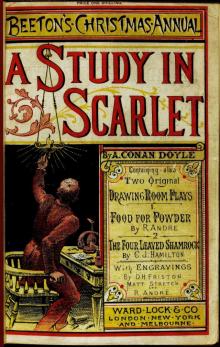 A Study in Scarlet
A Study in Scarlet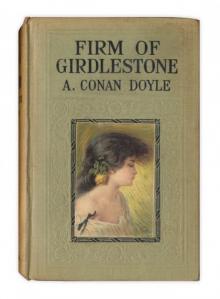 The Firm of Girdlestone
The Firm of Girdlestone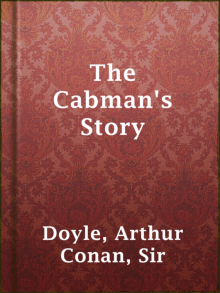 The Cabman's Story
The Cabman's Story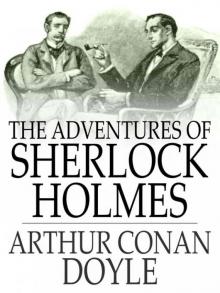 The Adventures of Sherlock Holmes
The Adventures of Sherlock Holmes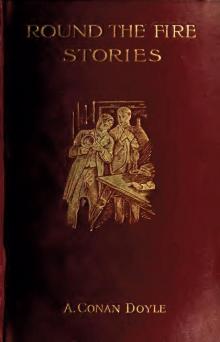 Round the Fire Stories
Round the Fire Stories His Last Bow: An Epilogue of Sherlock Holmes
His Last Bow: An Epilogue of Sherlock Holmes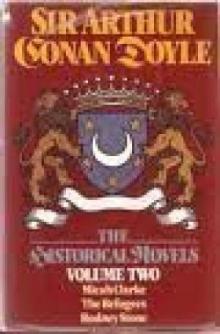 Micah Clarke
Micah Clarke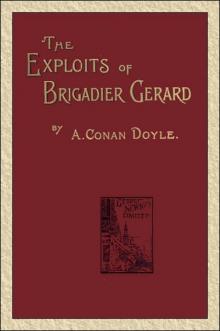 The Exploits of Brigadier Gerard
The Exploits of Brigadier Gerard The Gully of Bluemansdyke, and Other stories
The Gully of Bluemansdyke, and Other stories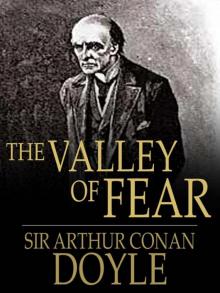 The Valley of Fear
The Valley of Fear The Last of the Legions and Other Tales of Long Ago
The Last of the Legions and Other Tales of Long Ago The Dealings of Captain Sharkey, and Other Tales of Pirates
The Dealings of Captain Sharkey, and Other Tales of Pirates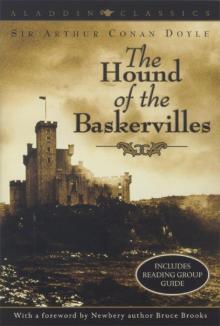 The Hound of the Baskervilles
The Hound of the Baskervilles The Great Shadow and Other Napoleonic Tales
The Great Shadow and Other Napoleonic Tales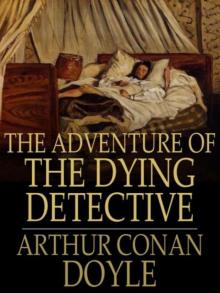 The Adventure of the Dying Detective
The Adventure of the Dying Detective The Man from Archangel, and Other Tales of Adventure
The Man from Archangel, and Other Tales of Adventure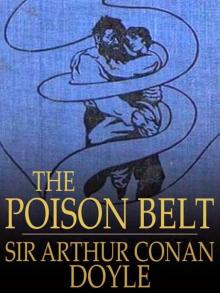 The Poison Belt
The Poison Belt The Last Galley; Impressions and Tales
The Last Galley; Impressions and Tales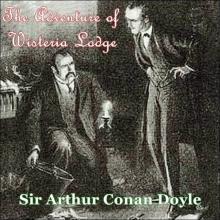 The Adventure of Wisteria Lodge
The Adventure of Wisteria Lodge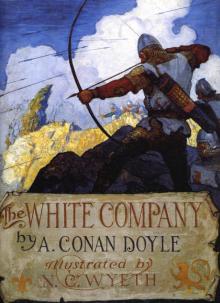 The White Company
The White Company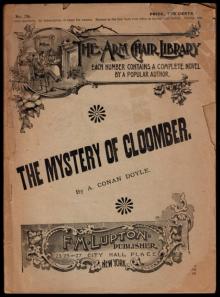 The Mystery of Cloomber
The Mystery of Cloomber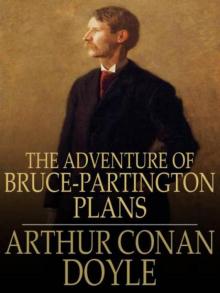 The Adventure of the Bruce-Partington Plans
The Adventure of the Bruce-Partington Plans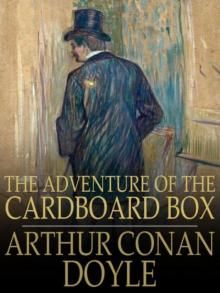 The Adventure of the Cardboard Box
The Adventure of the Cardboard Box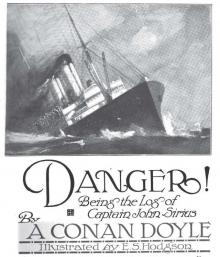 Danger! and Other Stories
Danger! and Other Stories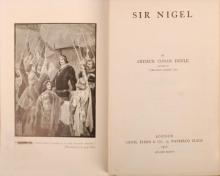 Sir Nigel
Sir Nigel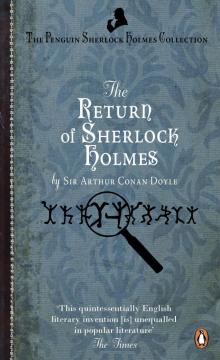 The Return of Sherlock Holmes
The Return of Sherlock Holmes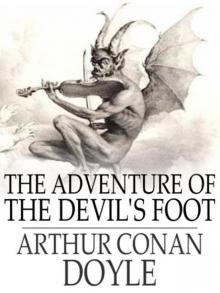 The Adventure of the Devil's Foot
The Adventure of the Devil's Foot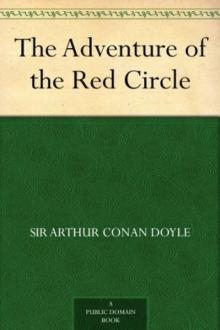 The Adventure of the Red Circle
The Adventure of the Red Circle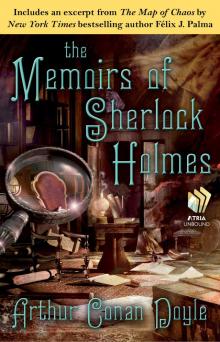 The Memoirs of Sherlock Holmes
The Memoirs of Sherlock Holmes The Adventure of the Yellow Face
The Adventure of the Yellow Face The Adventure of the Norwood Builder
The Adventure of the Norwood Builder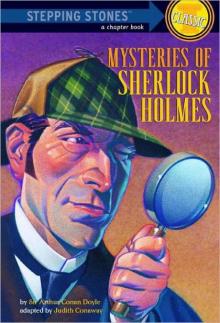 Mysteries of Sherlock Holmes
Mysteries of Sherlock Holmes The Adventure of the Missing Three-Quarter
The Adventure of the Missing Three-Quarter The Adventure of the Final Problem
The Adventure of the Final Problem A Scandal in Bohemia
A Scandal in Bohemia His Last Bow shssc-4
His Last Bow shssc-4 Beyond The City
Beyond The City The Adventure of the Gloria Scott
The Adventure of the Gloria Scott The Parasite
The Parasite The Land Of Mist pcs-3
The Land Of Mist pcs-3 The Adventure of the Musgrave Ritual
The Adventure of the Musgrave Ritual The Complete Sherlock Holmes, Volume I (Barnes & Noble Classics Series)
The Complete Sherlock Holmes, Volume I (Barnes & Noble Classics Series) The Adventure of the Stockbroker's Clerk
The Adventure of the Stockbroker's Clerk The Adventure of the Copper Beeches
The Adventure of the Copper Beeches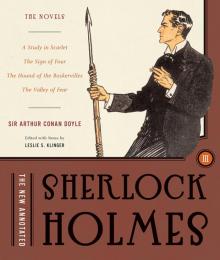 The New Annotated Sherlock Holmes
The New Annotated Sherlock Holmes When The World Screamed pcs-5
When The World Screamed pcs-5 The Adventure of the Six Napoleons
The Adventure of the Six Napoleons The Case Book of Sherlock Holmes shssc-5
The Case Book of Sherlock Holmes shssc-5 The Sign of Four
The Sign of Four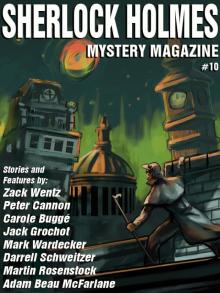 Sherlock Holmes Mystery Magazine #10
Sherlock Holmes Mystery Magazine #10 The Adventures of Brigadier Gerard
The Adventures of Brigadier Gerard The Adventure of the Second Stain
The Adventure of the Second Stain The Adventure of the Engineer's Thumb
The Adventure of the Engineer's Thumb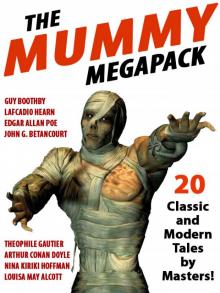 The Mummy Megapack
The Mummy Megapack The Disintegration Machine pcs-4
The Disintegration Machine pcs-4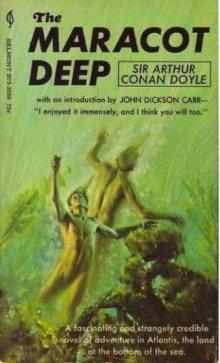 The Maracot Deep
The Maracot Deep The Five Orange Pips
The Five Orange Pips The Adventure of the Crooked Man
The Adventure of the Crooked Man The Adventure of the Blue Carbuncle
The Adventure of the Blue Carbuncle The Adventure of Silver Blaze
The Adventure of Silver Blaze The Adventure of the Solitary Cyclist
The Adventure of the Solitary Cyclist The Adventure of the Naval Treaty
The Adventure of the Naval Treaty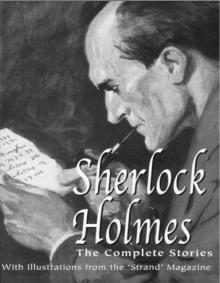 Sherlock Holmes. The Complete Stories
Sherlock Holmes. The Complete Stories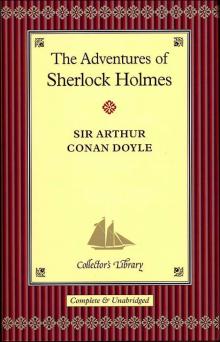 The Adventures of Sherlock Holmes (sherlock holmes)
The Adventures of Sherlock Holmes (sherlock holmes) The Adventure of the Empty House
The Adventure of the Empty House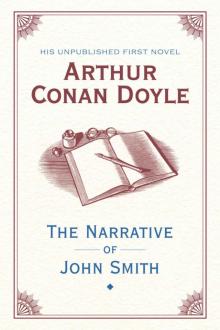 The Narrative of John Smith
The Narrative of John Smith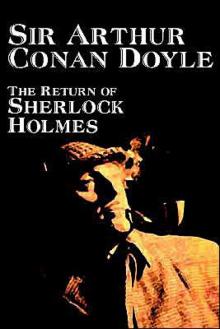 The Return of Sherlock Holmes (sherlock holmes)
The Return of Sherlock Holmes (sherlock holmes) The New Revelation
The New Revelation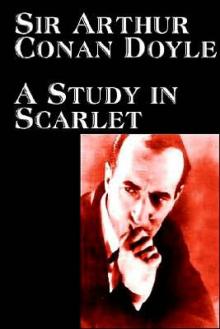 A Study in Scarlet (sherlock holmes)
A Study in Scarlet (sherlock holmes) The Vital Message
The Vital Message Sherlock Holmes Complete Collection
Sherlock Holmes Complete Collection Round the Red Lamp
Round the Red Lamp The Boscombe Valley Mystery
The Boscombe Valley Mystery The Adventure of the Beryl Coronet
The Adventure of the Beryl Coronet The Refugees
The Refugees The Adventure of the Three Students.
The Adventure of the Three Students.